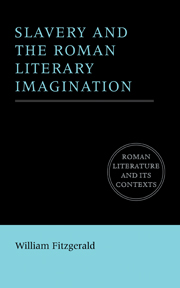Book contents
- Frontmatter
- Contents
- Acknowledgments
- Introduction: living with slaves
- 1 The other self: proximity and symbiosis
- 2 Punishment: license, (self-)control and fantasy
- 3 Slaves between the free
- 4 The continuum of (servile) relationships
- 5 Enslavement and metamorphosis
- Epilogue
- Bibliography
- General index
- Index of passages discussed
Epilogue
Published online by Cambridge University Press: 03 December 2009
- Frontmatter
- Contents
- Acknowledgments
- Introduction: living with slaves
- 1 The other self: proximity and symbiosis
- 2 Punishment: license, (self-)control and fantasy
- 3 Slaves between the free
- 4 The continuum of (servile) relationships
- 5 Enslavement and metamorphosis
- Epilogue
- Bibliography
- General index
- Index of passages discussed
Summary
When Shakespeare's Speed tells his master Valentine that “though the Chameleon love can feed on air, I am one that am nourished by my victuals, and would fain have meat” (Two Gentlemen of Verona 2.1.180f.) he echoes many a Plautine slave mocking the absurdity of his master's amours. European comedy knows the servus callidus in the zanni (clowns) of Commedia dell' Arte, the fourbes (knaves) of Molière, Beaumarchais' Figar o and a host of other literary servants, culminating in the Mr. Belvederes and Bensons of the American SitCom of the Eighties. Though ancient drama did not feature the cheeky soubrette quite as prominently as did, for instance, Beaumarchais, the ancestry of Suzanne in Le Mariage de Figaro includes figures like Casina's Pardalisca and Apuleius' Fotis.
Besides betraying their literary pedigree these figures also bear the marks, and pursue the agenda, of their own times. The eighteenth century is the golden age of the literary servant, but where the symbiotic duo of so much of Roman slave literature is trapped in endlessly repeatable routines that lead to no resolution, the servants of eighteenthcentury literature are often going places. At the beginning of the century, Lesage's cynical and ruthless servant Frontin closes the play Turcaret (1709) with the words “Voilà le règne de M. Turcaret fini; le mien va commencer” and, at the end of the century (1784), Beaumarchais' Figaro presages the Revolution with an attack on the privileges of birth (Act 5, sc.1). Where Plautus's slaves compared themselves to playwrights, Figaro actually has ambitions to be one. Robbins (1986) comments that “By the eighteenth century, the bourgeoisie had composed the subversive bits and pieces of hundreds of traditional servitors into such heroic portraits of its own servitude as Defoe's Moll and Richardson's Pamela, Lesage's Gil Blas and Beaumarchais' Figaro’ (80).
- Type
- Chapter
- Information
- Slavery and the Roman Literary Imagination , pp. 115 - 118Publisher: Cambridge University PressPrint publication year: 2000



